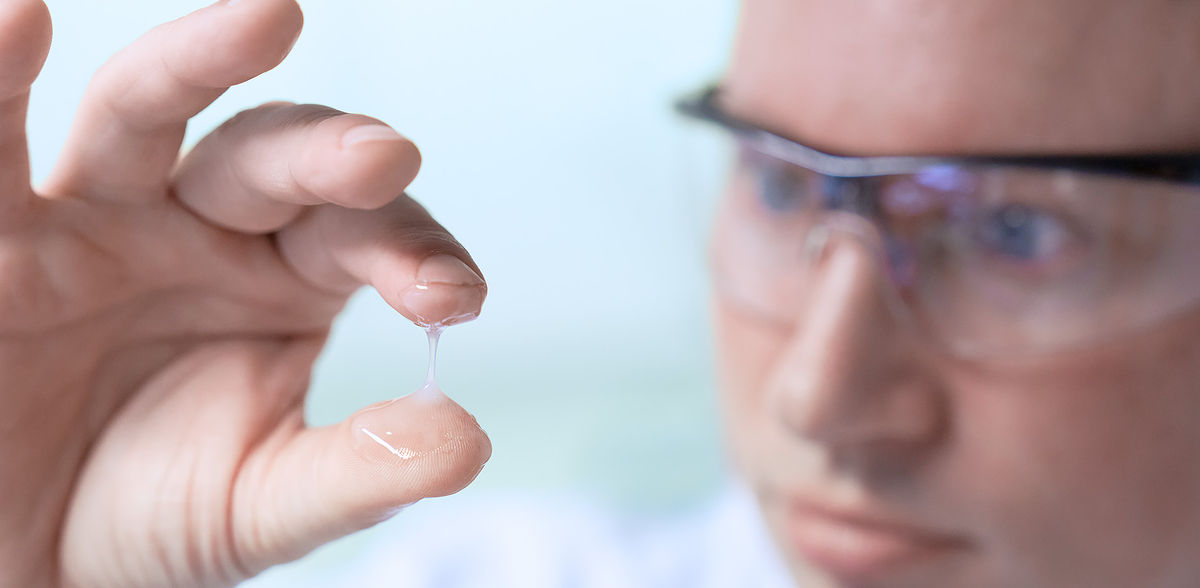Gluing with starch: bio-based adhesives for industrial applications
Replacing synthetic polymers in dispersion adhesives with modified starch products
Advertisement
folding boxes are considered sustainable packaging solutions for numerous everyday products – whether breakfast cereals, electronics, medicines, or perfumes. Made from paper and cardboard, folding boxes are resource-efficient in production, biodegradable, and easily recyclable. However, environmentally friendly adhesives are still lacking for completely sustainable manufacturing. Researchers at Fraunhofer Institute for Applied Polymer Research IAP are developing and testing bio-based adhesives for the industrial production of folding boxes in the project Sustainable Gluing With Renewable Adhesives (SUGRA).
Dispersion adhesives made from synthetic polymers currently set the standard for the industrial production of folding boxes on high-speed production machines. Their disadvantage: they mainly consist of fossil raw materials. Researchers at Fraunhofer IAP want to change that. Together with partners from industry and science, they are working on bio-based adhesives made from renewable raw materials.
Bio-based Adhesives: From the Laboratory to Industry
Adhesives for folding boxes must meet high standards. "The application quality, curing time, and initial adhesive strength, known as the initial tack, are important factors for successful production of folding boxes on high-speed machines," explains Dr. Jens Buller, head of the Starch Modification and Molecular Properties Department at Fraunhofer IAP. Modern folding box gluing machines reach production speeds of up to 600 meters per minute. Only a few seconds are available to create a stable adhesive bond. The small adhesive tabs in folding boxes also require particularly precise adhesive application. The adhesive must not splatter, drip, or form threads. If it enters areas that should remain adhesive-free, internal bonding can occur, making it impossible to assemble the packaging and thus use it.
Replacing Synthetic Polymers in Dispersion Adhesives with Modified Starch Products
"Even the choice of raw material affects the properties of the adhesive. For example, it significantly influences whether the adhesive forms threads," says Dr. Jens Buller. The team at Fraunhofer IAP has characterized, analyzed, and evaluated modified starch products to determine the suitable raw material. The researchers achieved the high initial tack, short curing time, and necessary flow and application behavior of the adhesive for industrial production of folding boxes through further modifications of the starch and formulation into starch adhesives. In the development, the scientists ensure that the adhesive is food compliant.
Successful Tests: Bio-based Adhesives in Use
The application quality of the bio-based adhesive variants has already been successfully tested in cooperation with industrial companies on high-speed machines with nozzle application. Furthermore, high initial adhesion and stability of the adhesive seam under high humidity and temperature have been demonstrated. In developing the adhesive, researchers take a holistic approach: Together with partners Baumer hhs GmbH, PTS – Institute for Fibers & Paper gGmbH, and Fraunhofer Institute for Coating and Surface Technology IST, they consider the interaction of the starch adhesive with the equipment, conditions, and environment of folding box production. "Our results show that bio-based starch adhesives are suitable for replacing synthetic polymers in folding box manufacturing. Additionally, they can significantly simplify recycling processes due to their good solubility. We are paving the way for completely environmentally friendly and sustainable packaging," summarizes Dr. Buller.





























































